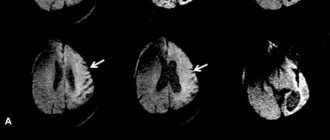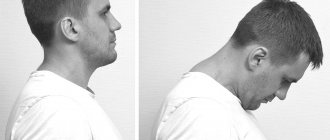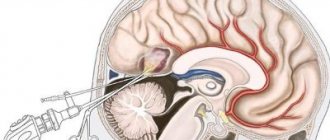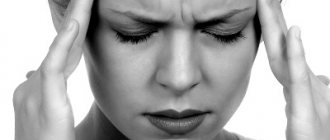Who among us has not heard elderly parents or other relatives complain about poor sleep? Do they tell you how difficult it is to fall asleep, how unpleasant it is to wake up suddenly in the middle of the night, how early the morning comes now? Pensioners often feel that they are not sleeping in the full sense of the word, but as if they are gliding on the surface of sleep, and any even faintly perceptible sound can wake them up. As a result, in the morning, older people lack their usual vigor, and, as a result, a loss of strength sets in, and anxious thoughts become more active.
A familiar picture: an old man wandering absent-mindedly around the apartment and it looks like he is in a somnambulistic state? Such symptoms of sleep disturbance resemble manifestations of Alzheimer's disease: memory suffers, attention decreases, simple logical tasks cause difficulties, coordination of movements is impaired, falls are possible, and reaction time slows down.
According to neuroscientists from the USA, special neurons responsible for inhibition of the nervous system are “to blame” for age-related sleep disorders. A good, full night's sleep is possible only with complete peace of mind, which these neurons provide. Unfortunately, as we age, the number of brain cells decreases: neurons experience oxygen starvation, their size decreases, they die, and accordingly, the risk of insomnia increases significantly.
Of course, insomnia plagues many, and age is not a prerequisite for it, but after 60 years, the fight against it becomes much less successful, and the inconveniences it causes gradually turn into serious problems. Young people often toss and turn, unable to sleep, when they are overwhelmed with worries about the events of the past day or are in anticipation of upcoming events, so episodes of poor sleep in the younger generation occur only from time to time. Elderly people, as a rule, very quickly acquire a chronic form of insomnia, which brings discomfort not only to their lives, but also to the lives of their loved ones. Of course, older people a priori sleep less and in a completely different way than young people: old people are little physically active, their social circle is forced to be limited, and the range of their mental tasks is narrowed. They usually go to bed early and get up early, and their sleep time at night is also reduced, and this is normal. However, regular insomnia, which interferes with adequate social and physical functioning, requires immediate attention to a specialist.
Gerontological specialists conducting research in nursing homes in the Leningrad region found out why night sleep is so important for the elderly. And here are the conclusions they came to:
- Sleep helps maintain immunity, which is important for being able to resist seasonal diseases and age-related ailments.
- Sleep perfectly restores strength, which is extremely useful for increased fatigue, which is typical for 100% of older people. Insomnia is exhausting, depriving you of the opportunity to live a full life, to be active and optimistic, because there is simply no physical strength left for this.
- Sleep prevents rapid wear and tear of the body and preserves the optimal functionality of systems and organs for a given age.
- Sleep helps strengthen memory, improve coordination of movements, maintain attentiveness and clarity of mind: in old age and close to it, this is very valuable.
Kinds
There are the following types of this disease:
- Primary insomnia. It occurs when sleep problems are not caused by illness or a specific situation.
- Secondary view. Formed against the background of the formation of some disease. This could be oncology, injury, heartburn, asthma, arthritis, or depression. The use of alcoholic beverages or medications can also affect the formation of such a problem.
Based on duration and frequency, the following types of insomnia are distinguished:
- Chronic. Regular problems that last for several months, or occur periodically every 3-4 months for many years.
- Spicy. This is a short-term sleep disorder that can last from 1 night to several weeks.
How to overcome insomnia?
Both medicinal and non-medicinal methods are used to treat insomnia:
- maintaining sleep hygiene;
- psychotherapy;
- physiotherapy, massage;
- relaxation techniques, breathing exercises, etc.
For acute insomnia, specific treatment is usually not required; removing the trigger that prevents you from falling asleep is sufficient. Chronic and short-term forms of insomnia are important to monitor together with your doctor. The specialist will determine the cause of insomnia and, if necessary, prescribe a course of sedative or hypnotic medications. These can be herbal medicines (Persen, Novo-Passit, etc.), melatonin-based medicines (Melaritm, Melaxen, etc.) or more serious prescription medications.
The drugs have contraindications. The attending physician should prescribe the drug and determine the dosage.
Causes
Various factors can provoke the formation of the disease, for example:
- serious physical and mental stress;
- heart diseases;
- disruption of the endocrine system;
- night work;
- change in the rhythm of life;
- gastrointestinal diseases;
- frequent air travel;
- diseases of the nervous system;
- emotional experiences;
- stress.
A serious effect on the nervous system is indicated by long-term use of sleeping pills, which can ultimately cause insomnia. In the case of prolonged use of such medications, the excitability of the nervous system only increases, which is why a person cannot sleep.
Symptoms
Symptoms of insomnia vary, but they are all associated with decreased sleep duration. The disease can manifest itself:
- difficulty falling asleep: a person tosses and turns for a long time, looking for a comfortable position, etc.;
- single or multiple awakenings during the night followed by lack of sleep;
- early awakening, due to which the total duration of sleep does not exceed 6.5 hours.
Lack of sleep inevitably affects a person's condition during the daytime. He feels weak, irritable, tired already in the morning. Excessive sleepiness leads to decreased concentration and slower thought processes. Human performance decreases significantly, and the number of errors increases.
Treatment methods
If a disease interferes with a normal lifestyle and causes discomfort, it must be treated. The recovery method must be determined by the doctor. If the cause of the problem is a minor factor, it is enough to change the daily schedule and stick to it for several weeks. If this does not help, the specialist will select special medications. You should not use them without a doctor’s prescription, as you may harm your own body.
In order to get rid of chronic insomnia, sometimes there are not enough drugs, you need to eliminate the causes and factors that could cause it. Therefore, some doctors prescribe a series of physical exercises and massages in parallel with the main treatment. In any case, it is important to listen to the recommendations of your doctor and follow them regularly.
Why is sleep so important for a person?
During sleep, a person’s hormonal levels are restored, nervous tension is relieved, processes in the brain slow down, allowing him to “rest.” Muscle tension is relieved. The heart rate and pulse rate are normalized. All recovery processes are started. The production of somatotropin (growth hormone) during sleep triggers the process of cell renewal in the body and regulates metabolism. Immunity is strengthened.
Lack of sleep leads to the development of chronic fatigue, headaches and migraines, and the risk of hypertension, coronary artery disease, and stroke. A person with insomnia is irritable, lethargic, whiny and often aggressive, which negatively affects his personal and social life. That is why it is extremely important to seek help from a specialist in time, who will select the optimal treatment methods for insomnia and return you to full and healthy sleep.
Online consultation with a specialist
regarding your question!
License number: LO-77-01-019036
Treatment results
Chronic insomnia can last more than several years, as a result of which the patient may face problems such as:
- excess weight;
- heart disease;
- gastritis;
- diabetes;
- high blood pressure;
- mental illness.
Insomnia should be treated and it is important not to do it yourself. As a result of a competent recovery program, within a few days you will be able to forget about the problem and sleep at night again. The main thing is to complete the course of treatment completely and move on to the rehabilitation process.
Why choose the KORSAKOV clinic?
- We work 24/7;
- Treatment of patients is anonymous and without registration;
- Possibility of receiving therapy in a hospital, outpatient and at home;
- Comfortable conditions for patients to stay in a modern hospital;
- Highly qualified doctors;
- Individual therapy programs that are selected by doctors after a comprehensive examination of the patient and diagnosis;
- Fixed prices for services;
- Result guarantee.
To make an appointment with a doctor, call a specialist at home, or get advice on any treatment issues, you can call: +7 (499) 288-19-74 . We work around the clock and are ready to help you at any time of the day or night.
Rehabilitation and lifestyle restoration
Did you manage to get rid of insomnia with the help of competent treatment? In this case, it is important to regularly carry out prevention and follow a daily routine. During rehabilitation, it is better to go to a sanatorium or spend this time in a special medical facility under the supervision of specialists. You should change your lifestyle:
- give up alcohol, drugs, smoking;
- go to bed at the same time every day;
- do exercises or go to the gym;
- do massages;
- often relax in the fresh air.
Provide all conditions for a restful sleep; the room should be dark and ventilated, the air in it should not be too warm. Before going to the “kingdom of Morpheus,” read a book and take a shower.
What to do for insomnia
To understand what to do with insomnia, it is important to understand the reason that caused it. A somnologist who studies sleep and treats sleep disorders will help with this. To combat insomnia due to fear and nightmares, you may need to consult a psychologist. Getting healthy sleep back is not difficult, especially with the help of a specialist. For this purpose, the doctor may prescribe sedatives or psychological training.
Walking and physical exercise 3 hours before rest helps with poor night sleep in adults. If you constantly wake up at night and suffer from insomnia, reconsider your diet; perhaps your body is not getting the necessary substances from food. To take the required dose of vitamins and minerals, eat more fresh vegetables and fruits.
Where to go if a problem arises?
The Kuntsevo Treatment and Rehabilitation Center is now particularly popular among patients with various problems, including insomnia. Experienced doctors work here, there is a diagnostic base, and special techniques are used for quick rehabilitation. Thanks to this, the patient, without leaving the medical facility, can carry out diagnostics, undergo the necessary specialists and even begin recovery.
The treatment and rehabilitation center employs leading city specialists, doctors and candidates of medical sciences. All of them have many years of experience, so you can be completely confident in the professionalism of the medical center’s staff. The clinic is equipped with modern technology that facilitates rapid diagnosis and treatment of pathologies.
Which doctor treats insomnia?
Some people do not consider sleep disturbances a problem. It is for this reason that they feel constant fatigue, weakness, become irritable and less attentive. However, if you do not deal with sleep disturbances in a timely manner, you can only complicate the situation and “earn” the problem of insomnia, which can develop into a chronic one. Therefore, it is better to consult a doctor who treats insomnia in a timely manner. Insomnia has a different nature, and accordingly, different specialists deal with the treatment of this problem. Despite the similarity of symptoms, doctors treating insomnia may offer different treatment regimens to restore and normalize sleep. This will depend on the diagnosis given to the patient suffering from insomnia.
If you notice a sleep disorder that has been bothering you for several days or even a week, we recommend that you do not delay solving the problem, but make an appointment with a doctor who treats insomnia at the Somnology Center in Moscow or the Sleep Medicine Center. Qualified assistance from a somnologist (a doctor who treats insomnia) will help you understand the causes of sleep disturbances and a decision will be made on further treatment.
Which doctor can help cure the problem of insomnia?
Therapist
The specialist conducts an initial examination, diagnosis, interview the patient and decides on the need to involve a specialist in the process - a somnologist, neurologist, psychotherapist.
The therapist asks the following questions
1. Amount of caffeine-containing drinks consumed.
2. Possible irritants that interfere with normal sleep and sleep at night.
3. Taking medications. Some medications, even those sold in pharmacies without a prescription, have a number of side effects, for example, they can provoke insomnia in humans. Strong drugs can also cause insomnia. At the initial appointment, the therapist identifies possible causes affecting sleep disorders.
At the initial stage, the doctor will try to eliminate the symptoms of insomnia without medications, because there are many methods that help cure sleep without medications. Drug therapy should be approached with extreme caution; some drugs are addictive and addictive. In some cases, the doctor’s general recommendations will help you improve your sleep and feel cheerful and strong in the morning.
Before you start taking medications, your therapist may recommend general blood and urine tests.
If the therapist sees the problem and can solve it on his own, he will prescribe a treatment regimen for the problem of insomnia. Compliance with your doctor's orders and following recommendations will help speed up the healing process. In cases where the therapist cannot solve the problem of insomnia on his own, the doctor redirects the patient to a specialized specialist.
Somnologist
The patient will be advised to make an appointment with a somnologist at the Sleep Medicine Center in Moscow or at the Somnology Center for diagnosis and treatment. The main thing for a patient with insomnia problem is to be less nervous and strictly follow the prescribed treatment. Before you panic about insomnia, try to create the most comfortable sleeping conditions possible. Regular walks in the fresh air, ventilating the room, following a daily routine, and controlling the consumption of caffeine-containing drinks can cure the problem of insomnia even without medications offered at the pharmacy without a prescription.
Sleep Medicine Center in Moscow on the basis of the Rehabilitation Clinic in Khamovniki
The somnology center in Moscow in Khamovniki (Efremova str., 12/2) has extensive experience in treating patients with problems of insomnia, snoring, and obstructive apnea. Modern treatment methods, such as cognitive behavioral therapy, polysomnography , CPAP therapy, meditation, used by doctors treating insomnia (somnologist) in Moscow, give excellent results and allow you to cope with the problem of insomnia in most cases once and for all.
The head of the Somnoligious Center in Moscow, in Khamovniki is Professor, Doctor of Medical Sciences, Honored Doctor of the Russian Federation - Roman Vyacheslavovich Buzunov .
Head of the clinic - BUZUNOV ROMAN VYACHESLAVOVICH - President of the Russian Society of Somnologists, Honored Doctor of the Russian Federation, Professor, Doctor of Medical Sciences, leading Russian expert on insomnia, snoring, sleep apnea and CPAP therapy, Professor of the Department of Regenerative Medicine and Medical Rehabilitation with courses in Pediatrics and Nursing , Clinical Psychology and Pedagogy FSBI DPO “Central State Medical Academy” UD of the President of the Russian Federation,
President of the All-Russian public organization "Russian Society of Somnologists",
Biography on Wikipedia
Information about outpatient consultations and examinations : www.buzunov.ru.
Make an appointment : +7 (495) 7-33-195, +7 (985) 77-33-195 The team of the Sleep Medicine Center based at the Rehabilitation Clinic in Khamovniki are top-level professionals who have focused their knowledge on the problems of sleep disorders. On the account of somnologists in Khamovniki in Moscow, hundreds of patients leave the clinic, overcoming the problem of insomnia (using the method of cognitive behavioral therapy), snoring, obstructive sleep apnea ( CPAP therapy ), and leaving positive reviews about the Somnology Center in Moscow in Khamovniki. The Sleep Medicine Center in Khamovniki is one of the best insomnia treatment centers in Moscow. Individual treatment regimens for insomnia for men, women, the elderly, children and adolescents are drawn up.
Neurologist
A neurologist also treats insomnia problems, but of a more complex nature. The doctor treats insomnia in the case of:
circulatory disorders in the brain;
Parkinson's disease;
consequences of stroke;
dementia;
increased ICP.
In such cases, insomnia cannot be cured quickly. If the above diseases are detected, additional studies of the patient’s body will be required. It is recommended to be patient and follow all doctor's orders. The doctor selects an individual treatment regimen and monitors the patient’s condition individually.
The neurologist, as a rule, prescribes potent drugs at the beginning of treatment. There is no need to self-medicate and increase the dosage in order to achieve a speedy recovery. This can only worsen the patient’s situation and cause a number of adverse reactions.
Psychologist
A psychologist treats insomnia in patients with severe psychological problems. Unfortunately, not every person suffering from insomnia is ready to see a psychologist. But you should not neglect your own health, but on the contrary, you should look for a solution to restore the body.
A qualified psychologist uses two common techniques: psychoanalysis and hypnoanalysis. Only a qualified, licensed doctor can use such techniques.
It is not recommended to visit doctors with a dubious reputation; interfering with a person’s psyche can aggravate the situation and cause adverse reactions. As soon as the psychologist was able to identify the problem, he begins to gradually push the patient to find a solution and accept the situation. The doctor does not teach life, but, on the contrary, tries to turn the vector of the problem in a different direction and direct the patient to find an independent solution. After sessions with a psychologist, the patient feels more confident and tries to improve the situation with insomnia with the help of simple recommendations from the doctor.
Test online:
Comprehensive sleep test
Test online:
Check if you have sleep apnea
For more information or to make an appointment with a sleep specialist, call5.
Call:
+7(495) 77-33-195
Leave a request:










